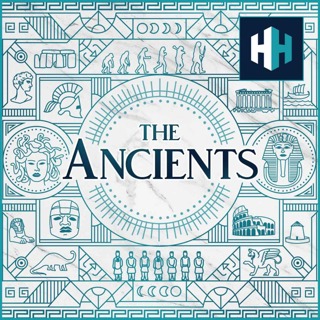
How Ancient Egypt Stayed Egyptian
The length of time between the rule of Cleopatra and the erection of the Pyramids is the same as that between now and the birth of Jesus Christ. With that in mind, it is perhaps no surprise that some periods of Ancient Egypt fall beneath the radar. The Late Period of Ancient Egypt, however, is not without drama. These final centuries are characterised by repeated invasions and leadership by foreign rulers. Chris Naunton is an Egyptologist, writer and broadcaster. He spoke to Tristan about the influence of external forces on Ancient Egyptian society from the Third Intermediate Period through the Late Period. This included Libyan, Assyrian, Persian and, notably, an Ancients’ favourite, the Macedonian Alexander the Great. Hosted on Acast. See acast.com/privacy for more information.
3 Jan 202155min

El Kurru: Egypt's Nubian Pharaohs
In the 8th and 7th centuries BC, Ancient Egypt was ruled by an extraordinary dynasty. This was the 25th Dynasty, also known as the Nubian Dynasty because of their Kushite roots. They maintained their Nubian identity, with one of the most striking examples of this being the site of El-Kurru. Situated in what is today Northern Sudan, this was one of the key cemeteries for the 25th Dynasty. Complete with unique-styled pyramids, beautifully-preserved wall paintings and tumuli, archaeologists have made some remarkable discoveries at this site over the past century. One such archaeologist is Dr Rachael Dann, from the University of Copenhagen. Alongside a dedicated team, Rachael has spent years working at El-Kurru. In this podcast she explains what we know about the site and the archaeology that survives. The second of our episodes on Ancient Egypt. Hosted on Acast. See acast.com/privacy for more information.
31 Des 202056min

Hatshepsut: Egypt's Hidden Pharaoh
Hatshepsut – whose name means “foremost of noblewomen” – was an exceptional figure in the history of Ancient Egypt. Only the second woman in history to assume the title of pharaoh, during her reign she oversaw the building of monumental temples, established trade connections with far away African powers and oversaw extended periods of peace. Hatshepsut's legacy in the history of Ancient Egypt is remarkable and the fact that her story has been largely-forgotten is one of the great tragedies of antiquity. To shine a light on Hatshepsut, Tristan was delighted to be joined by Lucia Gahlin, a brilliant Egyptologist with a great passion for the story of Hatshepsut. This was a great chat, enjoy. Lucia also stars in our new History Hit documentary about Hatshepsut, featuring alongside the likes of Kara Cooney and Monica Hanna. Please do have a watch: historyhit.com/hatshepsut Hosted on Acast. See acast.com/privacy for more information.
27 Des 20201h 4min

The Mystery of Mithras: A Pagan Christmas?
The clichéd Christmas: white snow, hot fires, mulled wine and a feast. This might not be the case were the holiday not to fall on 25 December and, although many things have been missed in 2020, the usual questions of whether this is the right date arrived reliably on time. So, for this episode, Tristan spoke to Professor Matthew McCarty to find out whether Christmas Day was really placed in December to supplant non-Christian worship, in particular that of Mithras. Matthew is Assistant Professor of Roman Archaeology at the University of British Columbia. He has been directing the field excavation of a mithraeum in Apulum (Romania), the first scientifically excavated mithraeum in the province of Dacia. In this festive episode, he shares his insight into the social dynamics of ritual practices in the sanctuary at Apulum and elsewhere. Hosted on Acast. See acast.com/privacy for more information.
24 Des 202054min

Saturnalia: Bonus Episode!
In this episode from the History Hit archive, Dan talks to Kevin Butcher about the Roman festival of Saturnalia. Held between the 17 and 23 December, Saturnalia invloved plenty of drinking, gift-giving, and a sense of a world turned upside-down. Hosted on Acast. See acast.com/privacy for more information.
22 Des 202026min

Hannibal: Crossing the Alps
In 218 BCE, Hannibal Barca's Carthaginian army, accompanied by horses and elephants, completed one of the most audacious military marches of ancient Mediterranean history. Setting off from southeast Spain, on their way they overcame a number of hostile Celtic tribes and traversed two major mountain ranges: the Pyrenees and then, most famously, the Alps. Battered and bruised Hannibal and his men eventually descended from the Alpine passes and arrived in Northern Italy at the end of 218 BC, where they soon clashed with the Roman legions awaiting them near the River Trebbia. This battle, fought on a snowy plain in freezing conditions, was the climax of the 218 BC campaign and the first of Hannibal's great victories against Rome.From the outbreak of the Second Punic War to the Battle of the River Trebbia, in this two-part podcast Dr Louis Rawlings, Senior Lecturer in Ancient History at Cardiff University, dives into the events of 218 BC and the incredible leadership of Hannibal. In this first episode, Tristan and Louis discuss the background to Hannibal Barca's march to Italy, before focusing in on one of the greatest adventure stories from antiquity: Hannibal's crossing of the Alps.Episode two, covering the Battle of the River Trebbia, will be released in a couple of weeks. Hosted on Acast. See acast.com/privacy for more information.
20 Des 202028min

Thucydides: Thoughts on the Athenian Empire
From 478 BCE until 404 BCE, a collection of Greek city-states were united under the leadership of Athens. Beyond inscriptions and a few minor sources, there is very little to tell us about life within this empire … that is, except the works of Thucydides, an Athenian historian and general who wrote a history of the Peloponnesian War. Professor Polly Low from Durham University spoke to Tristan about what we can learn from Thucydides work about this Athenian empire. How did Athens come to have this power? How did they keep their subjects in line? What did Thucydides miss out? Hosted on Acast. See acast.com/privacy for more information.
17 Des 202040min

The Garamantes: Farming the Sahara
Greco-Roman historians including Herodotus, Tacitus and Pliny the Elder would have us believe that the Garamantes were simple uncivilized cattle herders, living in sporadic camp dwellings. Until archaeological excavations began in the 1960s, this categorisation remained in place. Luckily, archaeologists like David Mattingly have dedicated years of research to sifting the fact from the fiction in the story of these residents of present day Libya. In this episode, David provides us with the revised version of the Garamantes’ civilisation. This includes masterful innovations in irrigation which allowed the Garamantes to farm two crops a year under the heat of the Saharan sun, as well as evidence of a social hierarchy and engagement in foreign trade. Listen as David turns the stereotype of the Garamantes on its head. Hosted on Acast. See acast.com/privacy for more information.
13 Des 202050min




















